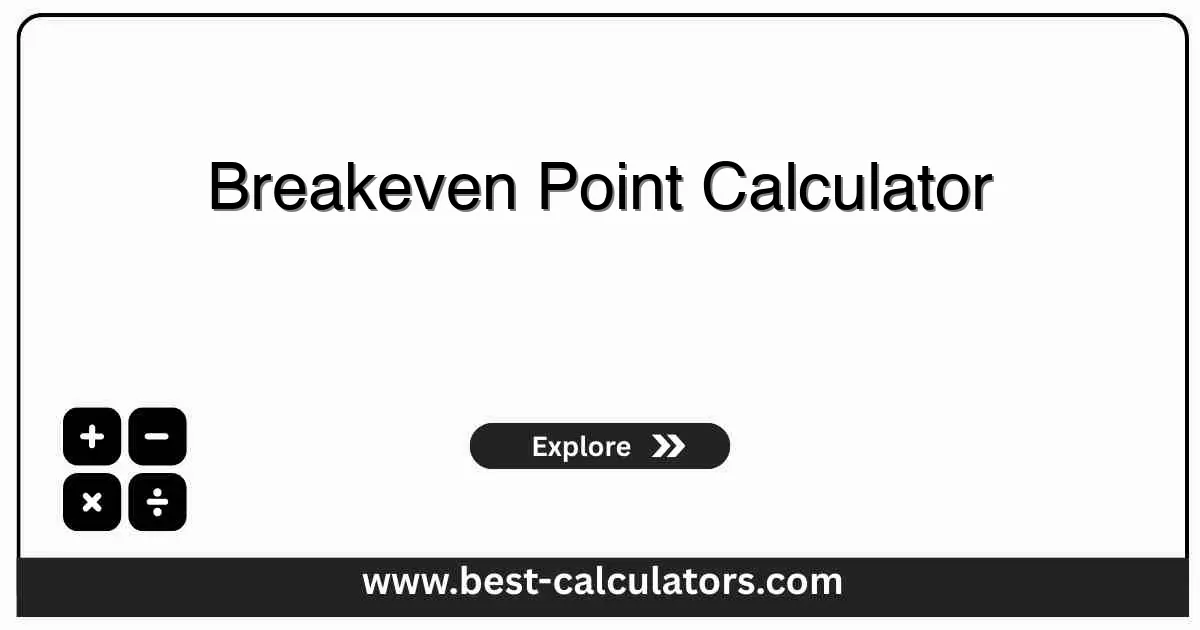Breakeven Point Calculator - Calculate Business Breakeven Units & Revenue
Determine how many units you need to sell to cover all costs and start making a profit with our free breakeven point calculator.
Breakeven Point Calculator
Results
Target Profit Scenario
Scenario Analysis
What is a Breakeven Point Calculator?
A Breakeven Point Calculator is a comprehensive financial tool that helps businesses determine the exact number of units they need to sell or the revenue they need to generate to cover all their costs (both fixed and variable) and achieve profitability targets.
This calculator works for:
- Retail businesses - Determine store sales targets
- SaaS companies - Calculate monthly recurring revenue goals
- Manufacturing - Plan production volumes and pricing
- Service businesses - Set client acquisition targets
- Startups - Validate business model viability
- E-commerce - Optimize product pricing strategies
For complementary analysis, you might find our Gross Margin Calculator useful for understanding your profit margins.
For SaaS business planning, check out our Customer Lifetime Value Calculator.
How Enhanced Breakeven Calculator Works
The calculator uses advanced business analysis formulas:
Enhanced features include:
- Industry benchmarks - Compare against sector standards
- Target profit analysis - Plan for specific profit goals
- Scenario planning - Test various business conditions
- Business type optimization - Tailored for specific industries
Business Analysis Concepts
Contribution Margin
Revenue minus variable costs; the amount that contributes to fixed costs and profit.
Margin Ratio
Contribution margin as a percentage of selling price; indicates profit efficiency.
Sensitivity Analysis
Testing how changes in costs or prices affect your breakeven point and profitability.
Industry Benchmarks
Compare your margins and breakeven points against industry averages.
How to Use This Enhanced Calculator
Select Business Type
Choose your industry for tailored analysis and benchmarks
Enter Fixed Costs
Include rent, salaries, insurance, and other overhead expenses
Set Selling Price & Variable Costs
Input your unit economics for accurate calculations
Define Profit Targets
Set your desired profit margin for strategic planning
Run Scenario Analysis
Test different business conditions and market changes
Analyze Results
Review breakeven, target profit, and scenario data
Enhanced Business Benefits
- • Industry-specific insights: Tailored analysis for your business sector with relevant benchmarks and standards.
- • Strategic profit planning: Set and achieve specific profit targets with detailed target profit calculations.
- • Risk assessment: Scenario analysis helps you prepare for market changes and economic conditions.
- • Investment decisions: Use analysis results for business expansion, product development, and resource allocation.
- • Performance benchmarking: Compare your metrics against industry standards and best practices.
Advanced Business Factors
1. Industry Economic Conditions
Market demand, competition level, and economic cycles significantly impact your breakeven requirements.
2. Business Model Complexity
SaaS, manufacturing, and service businesses have different cost structures and breakeven dynamics.
3. Scaling Effects
As you grow, fixed costs may remain stable while variable costs per unit often decrease (economies of scale).
4. Seasonal Variations
Many businesses experience seasonal demand patterns that require adjusted breakeven analysis.

Frequently Asked Questions (FAQ)
Q: What is a Breakeven Point Calculator?
A: A Breakeven Point Calculator is a comprehensive financial tool that helps businesses determine the number of units they need to sell or the revenue they need to generate to cover all their costs (both fixed and variable) and achieve profitability targets.
Q: How do you calculate the breakeven point?
A: The breakeven point can be calculated in multiple ways: 1) In units: Fixed Costs ÷ (Selling Price per Unit - Variable Cost per Unit), 2) In dollars: Fixed Costs ÷ (1 - (Variable Costs ÷ Sales)). Our enhanced calculator includes target profit scenarios and industry benchmarking.
Q: What makes this calculator different from basic breakeven calculators?
A: Our enhanced calculator includes industry-specific analysis, target profit planning, scenario analysis, industry benchmarks, and business type optimization for comprehensive business planning.
Q: What are fixed costs and variable costs?
A: Fixed costs are expenses that remain constant regardless of production volume (e.g., rent, salaries, insurance). Variable costs change with production levels (e.g., raw materials, packaging, direct labor). Understanding both is crucial for accurate breakeven analysis.
Q: How do I use the scenario analysis feature?
A: Enter percentage changes for price increases, cost reductions, or fixed cost increases to see how different business conditions affect your breakeven point. This helps with strategic planning and risk assessment.
Q: Why is the breakeven point important for businesses?
A: The breakeven point is essential because it helps businesses: 1) Set realistic sales targets, 2) Determine optimal pricing strategies, 3) Understand cost structure, 4) Make informed decisions about scaling operations, 5) Evaluate the financial viability of new products or services.